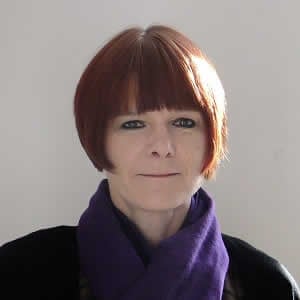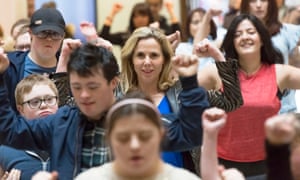One of Britain’s leading antenatal experts has strongly criticised a BBC film about children with Down’s syndrome, before its broadcast this week.
The documentary, A World Without Down’s Syndrome?, will be shown on Wednesday and is presented by the actress Sally Phillips, who has a child with Down’s herself. In the programme Phillips, known for her role as Tilly in Miranda, makes the case against the introduction of a new NHS pregnancy screening test that would detect with 99% accuracy the foetal abnormalities indicating Down’s syndrome.
Jane Fisher, director of Antenatal Results and Choices, an organisation set up to support parents affected by foetal screening and its consequences, said she thought the programme – in which she is interviewed – was “not at all helpful” to people facing difficult decisions around a prenatal diagnosis of disability.
“Sally is a very compelling presenter,” Fisher told the Observer, “and – absolutely – it’s great to have the positive images of people [with Down’s] who are already here. But it’s very personal, and it’s an extra layer of difficulty for couples and families who might be making the decision now about whether to end their pregnancy. It risks offering the suggestion to those who have [decided to end a pregnancy] that they have made the wrong decision.
“It’s too problematic to have one individual representing that choice – one who is an advocate for not screening, who has a high-functioning, much-loved child. A woman who admits she has the resources for extra help with her absolutely lovely little boy.” She added: “No one is casting aspersions on Sally’s son. Or trying to invalidate his right to be here.”
People with Down’s have an extra copy of a chromosome and have learning and developmental difficulties ranging from mild to severe. Some are more prone to serious health conditions, especially heart and thyroid problems.

Current testing for the condition takes place after 12 weeks, at which point women are told if they are at high or low risk. They can also be invited to have a more accurate – but invasive – amniocentesis test, which carries a one-in-100 risk of miscarriage.
The new test, non-invasive prenatal (NIPT), is a blood test that boasts a detection rate of 99%. Currently 90% of people informed that their child has Down’s choose to terminate the pregnancy. Anti-screening campaigners fear that rate will rise if the more accurate, non-invasive NIPT is made available on the NHS, something ministers are currently considering. When NIPT was introduced in Iceland, the termination rate rose to 100%. The test is already available in private clinics, costing around £400.
About 750 babies are born each year with Down’s syndrome in the UK, and there are an estimated 40,000 people living with the condition.
In a joint statement with the BBC, the programme’s makers, Dragonfly, said the film was intended to “bring difficult questions into the public arena. This film follows Sally Phillips as she explores what effect the test could have on our society, drawing not only from her first-hand experience but also by meeting several families who give an insight into their experiences of having a child with Down’s syndrome, as well as people with Down’s syndrome themselves. She also talks to health professionals and experts with a wide variety of views.”
Phillips, who is a Christian, is pro-choice, but says women are pressurised into having abortions by medics, and that the positives and rewards in parenting a disabled child are ignored. “Nobody knows what Down’s syndrome children can achieve,” she says.
There will always be people who choose not to screen, who choose to have the child. The point is choice
Anti-abortion groups are involved in the Don’t Screen Us Out (DSUO) campaign, calling on MPs not to introduce NIPT. Lynn Murray of DSUO has called the test the “new eugenics”.
But, according to Fisher, the programme’s warning of a potential “world without Down’s”, if NIPT screenings are introduced, is an over-simplification.
“Full respect for Sally,” said Fisher. “You can see her empathy and her love for her son, and wish for people to have a more positive attitude towards the condition. But it’s important we don’t get too simplistic about this. There will always be people who choose not to screen, who choose to have the child. The point is choice.
“We want to make sure that women who take the decision to end the pregnancy are not perceived somehow as saying they do not value people who are here – they are saying this is not something they can do, that it is not right for them or for their families.
“Not only does no one know how their child would be affected by Down’s, but the big conflict for women is the adult the child will be 20 or 30 years down the line. For most women, that is the bit that tips them to end the pregnancy. An adult who will be, at best, vulnerable,” she said.

The Down’s Syndrome Association has not taken a position either for or against the proposed new screening regime, focusing instead on its own Tell It Right, Start It Right educational campaign, which calls for better training and information provided for health professionals.
Carol Boys, chief executive of the charity and mother of a young man with Down’s, said: “For a long time, we’d been receiving calls from families who are going through the screening process and want more information. Quite a number complain about the way they have been treated.
“Our organisation wasn’t set up to make judgments, but you cannot make an informed decision if you don’t have all the facts. The problem with testing is that people go along and don’t really know what they are being tested for or the implications of the result.
“They find themselves in a high-risk category and don’t know what it means. The screening committee have asked us to help them with training, and we are happy to do that.
“We are essentially here for people with Down’s and their families. As far as life for people with Down’s goes, things have come a long, long way in the past 30 years. Life is always going to be more challenging. They have a learning disability, and they are always going to need extra help and support – but then so do a lot of other people in our communities.”
A World Without Down’s Syndrome? is on BBC2 at 9pm on Wednesday
Sally Phillips’s film on Down’s is ‘unhelpful’ for families, warns antenatal specialist
Hiç yorum yok:
Yorum Gönder